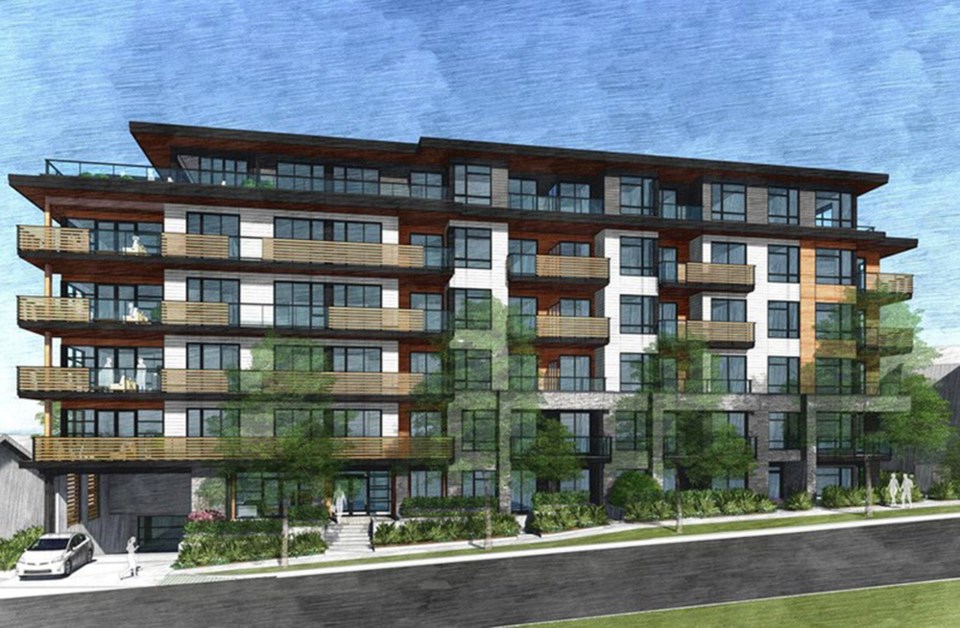Are micro-suites part of the housing affordability solution, or a contributor to the problem?
That’s the question several Port Moody councillors are wrestling with as they consider a development proposal for a six-storey condo complex on James Road that includes 57 little units that range from 300 to 392 sq. ft.
The project, by Port Moody realtor Bill Laidler, would be comprised of a total of 111 units, of which 11 would be fully accessible with wider hallways, adjustable countertops and roll-in showers. The developer said he’d also set aside 15% of the units to be part of a rent-to-own program that will allow owners to put rent that they pay for the first two years of occupancy toward a down payment.
But it’s Laidler’s pitch for tiny studio spaces that caught most councillors’ attention at Tuesday’s committee of the whole meeting.
He told councillors the small units, designed with “smart” features like stowaway storage and adjustable furniture that maximize the use of available space, are “a solution to a housing gap in our community.”
Laidler said young professionals and recent grads are challenged to get into the housing market. Even rents are getting out of reach.
“Where are the medium-income earners in our community living?” he asked. “They’re living with their parents and in shared housing.”
Laidler said that realization motivated him to modify his original plans for the condo project, essentially cutting in half many of the 64 units he first envisioned to create independent micro-suites that will likely sell for $350,000 to $400,000.
But several councillors expressed concern the units are more likely to attract investors who would then rent them at inflated rates rather than first-time buyers looking to establish roots.
Coun. Meghan Lahti said micro-suites are more suited to “dense, urban settings where people have access to a wide range of amenities,” adding the location for the proposed project — next to Moody middle school — is too far from either the Moody Centre or Inlet SkyTrain stations to attract residents eager to live a car-free lifestyle.
“Unless the placement of these spaces is done correctly, they can fall into squalor,” she said.
Lahti added such small living spaces are also becoming problematic as people ponder a post-pandemic future in which more of them will be working from home.
Coun. Amy Lubik agreed, saying the project’s location isn’t appropriate.
Coun. Diana Dilworth said Laidler’s plan for several indoor amenity rooms as well as an expansive rooftop deck aren’t enough to offset the project’s density.
“Where are all these people going to go?” she asked. “The trade-offs and benefits of this one aren’t worth it.”
But Coun. Steve Milani lauded the idea of micro-suites coming to Port Moody. He said they bring foot traffic and customers to local businesses, restaurants and cafés. “I lived in a micro-suite,” he said. “I kind of liked them.”
Mayor Rob Vagramov agreed with Laidler’s contention the small units would be attractive to young buyers. “Not every developer is going to bring something for families,” he said. “Young folks need places to live too.”
While a majority of council ultimately gave first reading to zoning bylaw amendments that will be required for the project to proceed, Vagramov said he also wants some assurance from the developer that units won’t end up in the hands of speculators if it’s to be ultimately approved.
Meanwhile, a six-storey rental project to be located on St. Johns Street, just east of the police headquarters, will go to a public hearing, despite some councillors’ reservations about the effect the 197-unit complex might have on neighbouring townhouses along St. George Street.
Lahti said the benefits the mixed-use project will bring to the community, including a non-profit daycare to be operated by the YMCA as well as a commitment by the developer to make six units available at non-market rents, outweigh any concerns.
“We need the non-profit daycare in Port Moody,” she said. “I think it’s a good fit.”



